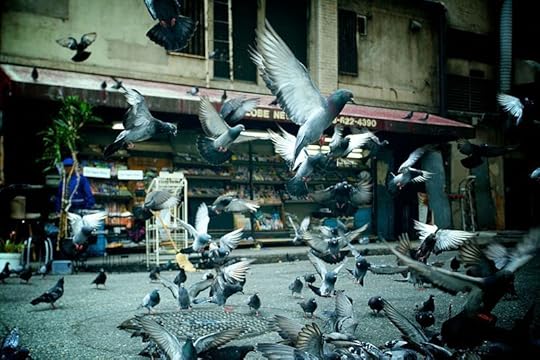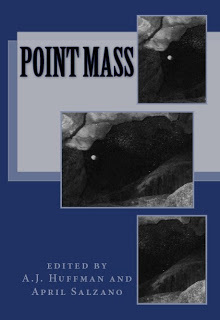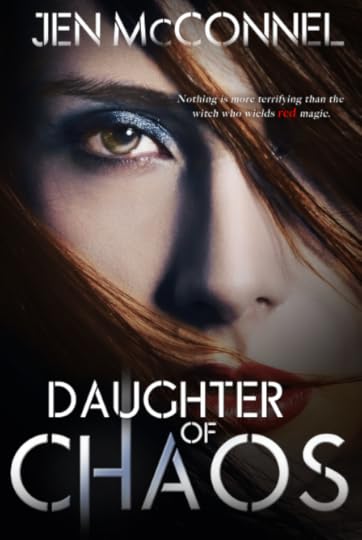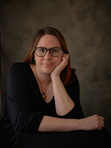Ally Malinenko's Blog, page 19
July 9, 2013
Magic Trick
Can I show your friend here, a magic trick, he says to my husband.
He’s old, frail, his voice so thin
it sounds like it traveled from Ireland through a tin can.
Of course, I say.
With shaking hands he folds a dollar bill over and over
until
when he unfolds it
it becomes a two dollar bill
and I express the right amount of wonder and delight.
One more, he says, taking out a stack of cards.
I need a pen he says.
There are two in his shirt pocket
and I point this out to him. He frowns.
Not those.
I imagine those are not real pens.
Write on the lamp he says. You know, so the genie will come out.
Write your phone number, he says and I raise my eyebrows.
He laughs and apologizes to my husband.
It’s hot in this bar,
where they don’t have any air conditioning
on a ninety degree day
and we were going to leave but the bartender is already
filling up our pints.
My husband wants to buy him a drink
but the girl says he only ever has the one.
Ready? he says and I pull out the card, the genie now visible.
I am wowed again and ask to keep it and he nods.
One more? he says.
I think of him late at night,
his shaking hands carefully
so carefully
lining up the one dollar bill
and the two dollar bill
so the edges are neat and clean
so that none of the glue is visible
so no one will be able to tell.
Doing all the hard work of illusion
so that we’ll keep believing
because the alternative
is more than this old man can handle.


July 4, 2013
Daughter of Chaos Cover Reveal
Jen McConnel was the first person in the whole wide world that wasn’t related to me or my friend who read my novel Lizzy Speare and the Cursed Tomb and then wrote about it on her blog. So you can understand why I’m so happy to be announcing that she’s got a new novel coming out via Month9Books!
Nothing is more terrifying than the witch who wields red magic.
Witches must choose the path they will follow, and Darlena Agara is no exception. She’s been putting it off long enough, and in her case, ignoring it has not made it go away. In a moment of frustration, Darlena chooses to follow Red Magic, figuring she had outsmarted the powers that be, since there’s no such thing as Red Magic. But alas, Darlena’s wrong (again) and she becomes a newly declared Red Witch.
Her friends are shocked and her parents horrified by the choice Darlena has made. As a Red Witch, she now governs one third of the world’s chaos. She is the walking personification of pandemonium, turmoil, and bedlam, just as the patrons of Red Magic would have it to be.
But Darlena believes there must be more to Red Magic than chaos and destruction, and she sets out on a journey to achieve balance. Only doing so puts her at odds with the dark goddess Hecate, who simply will not allow Darlena to quit. She encourages Darlena to embrace who and what she is and to leave good magic to the good witches. If only Darlena could, life would be simple, and she would not be the Daughter of Chaos.
DAUGHTER OF CHAOS is the first in a YA paranormal trilogy. Coming March 2014 from Month9Books.
ABOUT THE AUTHOR:
 Jen McConnel first began writing poetry as a child. Since then, her words have appeared in a variety of magazines and journals, including Sagewoman, PanGaia, and The Storyteller (where she won the people’s choice 3rd place award for her poem, “Luna”).
Jen McConnel first began writing poetry as a child. Since then, her words have appeared in a variety of magazines and journals, including Sagewoman, PanGaia, and The Storyteller (where she won the people’s choice 3rd place award for her poem, “Luna”).She is also a former reviewer for Voices of Youth Advocates (VOYA), and proud member of SCBWI, NCWN, and SCWW.
A Michigander by birth, she now lives and writes in the beautiful state of North Carolina. When she isn’t crafting worlds of fiction, she teaches writing composition at a community college. Once upon a time, she was a middle school teacher, a librarian, and a bookseller, but those are stories for another time.
Add DAUGHTER OF CHAOS on Goodreads!
Follow Jen McConnel on Twitter
Connect with her on Facebook.
Visit her website.
Nice, right? I’m so happy for her. Jen, you rock! Can’t wait to read it.


July 1, 2013
On Kafka, Richter and Memories
I have a strange relationship with posthumously published pieces. In the one instance, I desperately want to read them. Especially if it’s an author I really like because then as a reader I get to momentarily undo their death and hear one last story.
On the other hand it feels like cheating. It wasn’t finished. It wasn’t supposed to be shared. Like splitting open their skull and sticking your fingers in there to see what’s what.
It’s just wrong.
And I feel even more strange about posthumously published journals. That’s like a sin on top of a sin. Writing that is only meant for the writer should stay that way, right? Except as a reader, I love to read journals. I love to know what they were thinking when they were working on some of my favorite stories. Virginia Woolf’s journals were as enjoyable as any of her novels.
Yet I still feel strange about it.
It’s akin to loving the rich earthy smell of a recently dug grave.
After Kafka died, Max Brod, Kafka’s literary director, published his journals in 1948 and then, in 1953, he published what is known as The Blue Octavo Notebooks. These were Kafka’s journals….but also not his journals. They were not a recording of the movements and musings of a person in their daily existence. Instead they’re little vignettes, unrelated at times yet not disjointed. A review I read described the Notebooks as a “bag of exquisite marbles.”
That’s about as close to the mark as anything I could come up with.
They were penned from 1917 to 1919 and instead of being in the quarto size journals that Kafka used for his daily journals they were octavo-sized (hence the name).
Here, I’ll give you a sample:
Everyone carries a room about inside him. This fact can even be proved by means of the sense of hearing. If someone walks fast and on pricks up one’s ears and listens, say in the night, when everything round about is quiet, one hears, for instance the rattling of a mirror not quite firmly fastened to the wall.”
Beautiful, right?
Now that brings us to the video above, a piece entitled “On the Nature of Daylight”, by Max Richter from his album The Blue Notebooks which is music inspired by Kafka’s Blue Octavo Notebooks.
A second layer.
To read this collection AND listen to the music that was inspired by it has been an incredibly rich experience. The high lilting song of a violin, the clack of a typewriter and a woman (by the name of Tilda Swinton) reading the words of Franz Kafka 87 years after they had been written. Possibly written in secret. Possibly never meant to be shared.
And then in researching Kafka I discovered that while Kafka was writing the small sketches that would become the Blue Octavo he was reading Kierkegaard’s Fear and Trembling.
A third layer still….
How far back can we stretch here? What was Kierkegaard listening to when he wrote Fear and Trembling, what was he reading? We can peel back the layers.
Secrets within secrets.
Stories behind stories.
It does strange things to a person. Both the album and the book feel so familiar to me as if I had read them before in another life and am just now remembering them for the first time.
Like an echo bouncing off Jupiter and coming back to me after such a long journey.


June 28, 2013
A New Nephew
In the Hours
- for Wesley Edward
In the hours before you were born
I was underground, riding the subway
and trying to learn how this universe
that you are now a part of
like the planets
and the willow trees
and me
and her
and him
began
which is not an easy thing to do.
Beginnings are always the hardest.
This universe began
almost without reason or possibility.
At first there was nothing
and then there was something.
A something that grew to be filled with fireflies
and creaking steps
and the sea, which still waits to greet you.
A something that grew
the way you will grow to be filled with stories
to hear and tell and remember.
Stories that will save you one day
when you will hold in your open hands
all the hope you can carry.
The universe starts like a story
At first there was nothing,
and then there was something.
A something with sisters
and tin cans and secrets whispered
between the cracks in the doors.
A language that can change you.
We are only made of words and wishes
bound tight in courage.
A something with courage, yes
to dance and to tumble
to rule like a summer king
to fight and to fly
in the days that will come.
A something we didn’t know
we needed until just
now.
This is your story, Wes.
And this is how it begins.


June 25, 2013
The Blue Hour Anthology Volume Two Pre-order, AKA the onus is on us
[image error]
The Blue Hour, which is truly a great press, now has their second Anthology available for pre-order. I’m not saying you should get it cause they were kind enough to include me, but because it is a solid intense moving collection of poetry. And because if we don’t support small presses giving voice to new writers and artists, then who will?
The onus is on us – if you care about art or you make art – you have entered into a contract by which you will support art.
Ms. Moriah LaChapell Shalock posted the following quote on facebook and it deserves repeating:
Publishing a volume of verse is like dropping a rose petal down the Grand Canyon and waiting for the echo
-Don Marquis
All the information you could possibly need is here:
The Blue Hour Anthology Volume Two Pre-order.
While you’re thinking about it, check out the first anthology and Better Cigarettes and Other Poems by Phillip Vermass who also runs Misfit’s Miscellany.
Really good stuff.
Don’t let the echo go unheard.


June 21, 2013
Poem – Savagery

Savagery
While I understand
it is a savagery
that overtime will be
abated
though not
extinguished
and that it grows from
intuition
and not
understanding
I still find it terrifyingly poignant
to watch a shrieking toddler
chase a pigeon
with such ferocious determination
as if
were he able
he would catch each of us
and crush us
between
those sticky
little fingers.


June 20, 2013
Six Gallery Bowie
So back in 2008, Six Gallery Press published my first (and currently only) book of poems entitled The Wanting Bone.
Why am I telling you this? Cause they got a new blog and I think you should check it out.
They publish really great writers like John Grochalski (who in full disclosure I am married to, but my opinion of his writing is totally unbiased, I swear) and Don Wentworth (who not only is a fantastic poet but runs Lilliput Review one of my favorite mags) and Scott Silsbe and Jason Baldinger and Jonathan Moody and Kris Collins and lots and lots of other really really great writers.
Prove it, you say? Here, in fact, is a bit of that pudding:
Stop counting syllables
Start counting the dead
- From Past All Traps by Don Wentworth
History isn’t like us at all, it seems. And lately,
it’s hard to tell who’s doing the remembering anyway.
At any rate, the chalkboards tire of synonyms.
and all those left behind mourn less and less.
Everything’s erasable for someone at a dead end.
No regrets this year. Better luck next time.
- From Beyond Naming by Scott Silsbe
See? Really great stuff.
In other non related news, here’s some Bowie. Why? Because…it’s Bowie.
The thing I love about this video is that even though Tilda Swinton is in it, I’m still not convinced that she and david bowie are not the same person


June 19, 2013
Point Mass Anthology

Since my last post was so long, I’ll keep this one short.
I just wanted to say thank you to AJ Huffman at Kind of a Hurricane press for including my poem, Astronaut in her anthology Point Mass.
You can download the whole thing here for free or you can buy a paperback copy from Amazon.
See? Nice and short.


June 13, 2013
If we knew what it was we were doing, it would not be called research, would it?
The title is an Einstein quote.
Put on your smarty glasses kids. We’re gonna talk about Research.

The reading room of the Suzzallo library of the University of Washington in Seattle, WA, was built in 1926 and has a Gothic interieur. Photography by Cap’n Surly Flickr.com
One of my favorite parts about writing a book is doing the research. When I was writing Lizzy I spent hours looking up mythological creatures and Shakespeare in the library. I used books like Barthe’s and the Encyclopedia of Imaginary Places and books on how keys were invented and books about Elizabethan England and it was tons of fun.
So for my new book, Palimpsest (which I’ve talked about a little here and here and here ) I present my currently reading or recently read research list:
Elegant Universe: Superstrings, Hidden Dimensions and the Quest for the Ultimate Theory
Forever Today: A True Story of Lost Memory and Never Ending Love
Memories, Dreams and Reflections
On The Sea of Memory: A Journey from Forgetting to Remembering
Universe in a Nutshell
The Chess Machine
Endgame: Bobby Fisher’s Remarkable Rise and Fall – from America’s Brightest Prodigy to the Edge of Madness
Bobby Fisher Goes to War: How the Soviets Lost the Most Extraordinary Chess Match of All Time
Everything Chess Basics Book
Great Wall of China
History of Chess
Proust was a Neuroscientist
There’s probably a few that I’m missing….
And I’ve also branched out into podcasts on topics that I want to include like time travel, and memory, how the universe came into existence and the multiverse and doppelgangers and how our brains are wired and… and… and…
You know, easy stuff.
So I discovered RadioLab which is my new obsession. They define themselves as a show about curiosity and that is without a doubt the simplest way to put it. Here a few of my favorites. All the descriptions are from the Radiolab website. I embedded what I could for your listening pleasure.
Memory and Forgetting
This hour of Radiolab, a look behind the curtain of how memories are made…and forgotten. Remembering is an unstable and profoundly unreliable process–it’s easy come, easy go as we learn how true memories can be obliterated, and false ones added. And Oliver Sacks joins us to tell the story of an amnesiac whose love for his wife and music transcend his 7-second memory
Memory and Forgetting includes Eternal Sunshine of the Spotless Rat, Adding Memory and Clive which are parsed out below.
Eternal Sunshine of the Spotless Rat
What is a memory? Science writer Jonah Lehrer tells us is it’s a physical thing in the brain… not some ephemeral flash. It’s a concrete thing made of matter. And NYU neuroscientist Joe LeDoux, who studies fear memories in rats, tells us how with a one shock, one tone, and one drug injection, you can bust up this piece of matter, and prevent a rat from every making a memory. LeDoux’s research goes sci-fi, when he and his colleague Karim Nader start trying to erase memories. And Nader applies this research to humans suffering from PTSD.
(This podcast was what lead me to read Jonah Lehrer’s book, Proust was a Neuroscientist)
The story of a man who’s lost everything. Clive Wearing has what Oliver Sacks calls “the most severe case of amnesia ever documented.” Clive’s wife, Deborah Wearing, tells us the story along with Oliver Sacks. And they try to understand why, amidst so much forgetting, Clive remembers two things: Music and Love.
(This podcast is what lead me to read her book listed above, Forever Today)
We start this section off with a question from writer Andrei Codrescu: “where do computers get their extra memory from?” And then we take it literally. Can you add memories?Dr. Elizabeth Loftus says yes. She’s a psychologist in the department of Criminology, Law and Society at the University of California at Irvine, and her research shows that you can implant memories—wholly false memories—pretty easily into the brains of humans. Her work challenges the reliability of eye-witness testimony, and is so controversial that she once had to call the bomb squad. Then, producer Neda Pourangbrings us the story of finding a lost memory. Painter Joe Andoe incessantly paints huge canvasses of seemingly random images: horses, pastures, and – more recently – a girl with a particular about-to-say-something look on her face. He didn’t realize until recently that he’d been painting a day from his past, a fragment of an afternoon 30 years earlier.
Robert and Brian Greene discuss what’s beyond the horizon of our universe, what you might wear in infinite universes with finite pairs of designer shoes, and why the Universe and swiss cheese have more in common than you think.
Have you wondered if there is another you out there? Somewhere? Sitting in the same chair, reading the same blog post, wearing the same clothes and thinking the same thoughts? Well, Brian Greene says there must be one. Or two. Or lots and lots and lots and lots and… Why? You ask, well listen to Greene’s argument in this week’s podcast.
We are still furiously working on Season 5, so while you wait we bring you today’s podcast of a conversation between Robert Krulwich and Brian Greene, physics and mathematics professor and director of the Institute of Strings, Cosmology, and Astroparticle Physics at Columbia University. The interview is part of a series called ‘Giants of Science‘ hosted by venerable New York institution, the 92nd St Y.
(Brian Greene wrote Elegant Universe from the list above)
And of course never underestimate the power of Wine + Doctor Who = Mind Blown when it comes to ideas. Big ball of wibbley wobbley timey wimey….stuff.
Research is one of my favorite parts because it’s when my books and my desk get covered in post-it notes and ideas are popping up like little delicious bubbles all over the place and I drive my poor husband crazy talking about it. The hard part is mashing it all together. That’s the point when I start to think that maybe, just maybe, I’m not clever enough to pull this off!


June 12, 2013
Nine Years Later

Anniversary
“I’ll wait for you. And should I fall behind wait for me”
-Bruce Springsteen
We clink glasses,
exhausted from another late night
in a long week
and I tell you that 9 years ago tomorrow
we were in New Orleans
me feeling sick
from the heat but soon sicker
from eating year old cake.
And you smile.
And then you tell me
where we were every year since
2006 was Monroe
2007 was Brooklyn
just like 08
but 09 was New Orleans again
and 10, and 11 we did dinner at
that new brick oven pizza place in our neighborhood
carried flowers, crossed bridges
12 was Florence
and I smile
thinking about standing there, outside
the Thai place in Pittsburgh sixteen years ago
our first dinner finished
the wine all drank
when you said
What do you want to do now?
And I said,
It doesn’t matter.
As long as it
doesn’t involve me going one way
and you going another.
And it hasn’t love,
It hasn’t.






